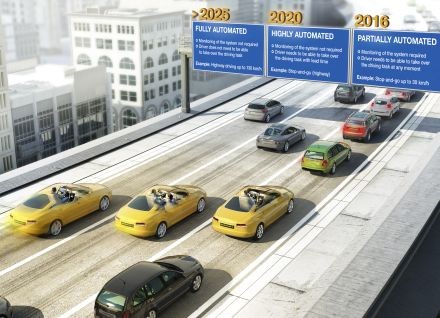

Vehicle automation is set to be rolled out in stages, starting with partially automated driving from 2016, high levels of automation from 2020 and – ultimately – fully automated systems available from 2025. Source: Continental
BMW and Continental have joined hands to develop a co-pilot system which can enable ‘highly automated driving’ on highways. According to a press release, the two companies signed a cooperation agreement in January this year, creating a two-year joint research project due to run until the end of 2014.
The partnership is aimed at identifying long-term fundamentals required in commercialising co-pilot systems for highway driving beyond 2020. Over the course of two years, the two companies will develop several prototype vehicles equipped with automated driving mechanisms. These vehicles, claimed to be featuring near-production technologies, will be tested by trained participants on highways in Germany and other European countries. The cars will manoeuvre across several obstacles including motorway intersections, toll plazas, roadworks and national borders.
The prototypes, based on BMW cars, will be equipped with Continental’s driving environment sensor systems using both long-range radar and camera systems already in series production. The company will also design safety architecture to enable the vehicle to operate properly in case of malfunctioning.
Significance: Automated driving is increasingly being seen as the ultimate solution to making road transportation sustainable and collision-free. Several automakers including BMW, Toyota, Renault, Nissan and Volvo are looking at autonomous vehicle driving technologies with interest, though the level of automation in projects varies, with BMW and Toyota largely focusing on co-pilot systems, which can help the driver employ safer driving techniques. Volvo, on the other hand, is working on driver-less cars, with zero human intervention, aiming to come out with first production vehicles in 2014 which can self-drive at speeds up to 31mph. Various technical research centres and universities are also pursuing driver-free car technologies. Oxford recently road tested a self-drive Nissan LEAF electric vehicle. The autonomous driving system in the vehicle is claimed to cost up to USD8,000 today, but the price can eventually go down to as low as USD150, claims Oxford. Although absolutely driver-less cars could still take reasonably long, perhaps decades, to make it into series production, co-pilot systems appear to be operationally more viable and economically feasible over the long term.








